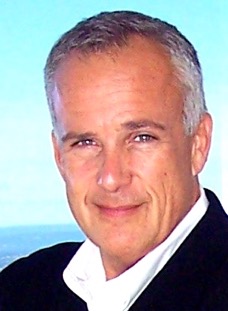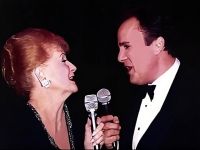
Paul Bernhardt partnered with legendary singer Margaret Whiting in past years for a series of critically acclaimed cabaret shows. As a recording studio session singer, he's been featured on national radio and TV commercials and as a musical guest on "Late Night with Conan O'Brien." Paul has toured as a drummer/singer with rock legend Tommy James as a "Shondell" and he's also performed with Kenny Vance and the Planotones. Paul is excited to be back sharing his favorite songs with friends old and new!
"Creating a show with Paul was a blast! I haven't had such fun since those duet days with Mel Torme."
Margaret Whiting
"...a skilled jazz singer with a fine sense of timing,."
Rex Reed, New York Observer
"...he reaches below the surface to make the song a three dimensional portrait of life."
James Gavin, New York Times
"Pauly B...One of my favorite people and singers of all time...Music from the heart that enters your heart."
Kenny Vance, The Planotones
"...he echoes the geniality of that ultimate master of airy pop-jazz, Nat King Cole."
Stephen Holden, New York Times
![]()
Not Afraid Of Tears In a Tought Guy's World...
By: James Gavin
The newer male singers of jazz tend to avoid that dark inner world, finding it safer to recycle the old pseudo-hip clichés of the form. But last year, a promising mixture of finger-snapping nimbleness and heart appeared in New York, seemingly out of nowhere. Paul Bernhardt, a former jingle and studio singer, joined the veteran pop star, Margaret Whiting, at Arci's Place for two engagements. Mr. Bernhardt has some of the slick veneer of Mel Tormé, one of his idols. But in ballads like Billy Joel's ''I've Loved These Days'' and Stephen Sondheim's ''I Remember,'' he reaches below the surface to make the song a three-dimensional portrait of life, without hiding his bruises behind a coat of armor.

Margaret Whiting and Paul Bernhardt live at Arci's place
By: Rex Reed
 Margaret Whiting is making a rare appearance at Arci’s Place, the most attractive cabaret room in town (and the one with the most delectable food), sharing her stage with dashing, talented newcomer Paul Bernhardt. Besides providing a strong, manly shoulder to lean on, he’s a skilled jazz singer with a fine sense of timing. When he’s up at bat, he holds attention with his sensitive phrasing on classic ballads like “Skylark” and scats with hearty self-assurance on up-tunes like Nat King Cole’s “Straighten Up and Fly Right.” His killer highlight is a tender, bruised and eloquent reading of Stephen Sondheim’s “I Remember” that promises great things to come.
Margaret Whiting is making a rare appearance at Arci’s Place, the most attractive cabaret room in town (and the one with the most delectable food), sharing her stage with dashing, talented newcomer Paul Bernhardt. Besides providing a strong, manly shoulder to lean on, he’s a skilled jazz singer with a fine sense of timing. When he’s up at bat, he holds attention with his sensitive phrasing on classic ballads like “Skylark” and scats with hearty self-assurance on up-tunes like Nat King Cole’s “Straighten Up and Fly Right.” His killer highlight is a tender, bruised and eloquent reading of Stephen Sondheim’s “I Remember” that promises great things to come.
Miss Whiting generously hands him a hearty share of the spotlight and even joins him on several duets. At 76, her voice has been through its share of potholes, her phrasing is cautious and some of her famous verve is missing, but this is a gal from the college of musical knowledge who has already forgotten more than most of today’s chick singers will ever learn. So her humor, her surprising way of taking you off-guard with a lyric and her genuine love of the great popular American songbook all make up for the rough edges. She brings a lot of history to the microphone on classics like “My Ideal” and “That Old Black Magic,” and it’s always a treat to share quality time with a valuable artist of her accomplishment. Mr. Bernhardt, of course, has no history, but I feel certain it won’t be long before he makes some of his own.
The fabulous Margaret Whiting on luck, celebrity friends, and the joys of supporting young talent.
By: Jim Caruso
JIM CARUSO: Congratulations on your hit show with your new "discovery," Paul Bernhardt. It's gotten wonderful reviews.
MARGARET WHITING: Thank you! We're having the most marvelous time. I'm known as a singer, not a comedian; but in finding and working with Paul, we've found such fun things to do! He's got such a crazy sense of humor. The show has a plot, but we've started to ad-lib between the songs. Every night, it's different. I love creating a party atmosphere, and that's exactly what we're doing. I never know what's going to happen!
JC: It's like being on a high wire.
MW: Yes, and I love that feeling.
JC: How did you meet Paul?
MW: We met at the O'Neill Center Cabaret Symposium, where I was teaching, and we had an immediate rapport. We sat around and talked and sang, and my husband Jack [Wrangler] had the idea that we do a show together. Jack asked me if I thought we could do it and I said, "Well, of course!" It was as simple as that.
JC: Never say no, right?
MW: Well, there are some things I'd say no to...and some people!
JC: Growing up in Hollywood as the daughter of [songwriter] Richard Whiting, you certainly were lucky to learn from the very best. I'd say Paul is pretty lucky, too.
MW: After he read all the reviews for our show this past week, he called me and said, "Thank you for making me lucky!" Isn't that sweet?
JC: Do you consider yourself a lucky person?
MW: Of course! Johnny Mercer was really responsible for getting me a recording career at Capitol Records. Plus, I got the right songs. That was lucky.
JC: You like working in tandem with other people, don't you?
MW: I've worked by myself a lot, but it's true. Of course, there was "Four Girls Four," which I did with Rosemary Clooney, Helen O'Connell and Rose Marie. I also found myself singing with Johnny Mercer, Dean Martin, and Jerry Lewis on records. I did the NBC Comedy Hour with Danny Thomas, Red Skelton, and lots of other comics. Working with all those guys, you really learn how to work a joke and throw a punch line.
JC: Any favorite comic moments?
MW: Bob Hope and I were doing a show together, and he was going on and on about wine. I said to him, "You tell 'em, purple foot!" He almost had to tie me down for five minutes so I wouldn't say the next line over the laugh. He was so marvelous to work with and learn from.
JC: You love finding new talent, don't you?
MW: It comes very easy for me, teaching up at the O'Neill. I'd work with the kids, then they'd come to the house with their piano player. How did you and I miss singing together?
JC: There's still time. I'll be right over.
MW: I'm ready for you! You know, when you're around talented young people all the time, you can kind of tell who's going to make it. I'm so happy when people don't just stick to one thing, too. I always tell them not to just do theater or cabaret or movies...do everything! When I did Dream on Broadway with John Pizzarelli, I could tell he was well on his way. I knew Mary Cleere Haran had something special the first time I saw her; she has wonderful humor and tells such great stories. I first saw Ann Hampton Callaway when she was singing in a bar in the lobby of my building! People were lined up by the millions just to hear her.
JC: You and Julie Wilson have become godmothers to all of the up-and-coming club Singers. It's quite an attractive trait to be so supportive of young talent.
MW: Julie is amazing at that; a remarkable woman. We both know that, when you do something nice, it reflects right back at you.
JC: You grew up around some of the greatest talents this country has ever seen.
MW: It's true. Jerome Kern, Frank Loesser, and Ira Gershwin would all come to the house to see my father. Then later on, the newer ones--like Johnny Mercer, Ralph Blaine, Hugh Martin, and Kay Thompson--would all come over and sing. We had wonderful parties. One night we had a big bunch for dinner; the phone rang and it was Johnny Mercer. He said, "Are you alone?" I said, "No, I'm with Judy Garland, Mickey Rooney, Mel Tormé, Martha Raye, and--by the way--me." He said, "Well, we're coming over." I asked, "Who's we?" To which he replied, "Me and Harold Arlen!" So they came over and played "This Time the Dream's On Me" and some other tunes, and we all flipped. Then they played "My Mama Done Tol' Me," which was the original title of "Blues in the Night." Well, we made them play it six times. Mel said, "I've never heard anything like it." Mickey said it was the greatest song he'd ever heard. Martha, for once, couldn't say a word. And Judy and I ran to the piano to see who could learn it first! Those Hollywood years were wonderful times for me.
JC: You've always spanned the gamut of musical styles.
_MW: I love it all!
JC: What about those amazing nightclub happenings I've heard so much about?
MW: We still talk about Ciro's. That was the first place Dean Martin and Jerry Lewis worked together. Then there was Kay Thompson and The Williams Brothers. She had been the vocal arranger at M-G-M, and shewas so brilliant. She put on a show like we'd never seen; we went every night for a month! There wasn't really anything called "cabaret" at that point. Johnny Walsh, a man with gray hair who waved a long handkerchief, worked between two pianos: It was called Café Gala, and all the Hollywood people came. It was a new experience. That was really the first cabaret act I saw. Then Bobby Short started making waves. There were great pianists and, if called upon, we would get up and sing. Hollywood was so exciting, and there was real class to the town then.
JC: How different is it for you to go back now?
MW: Well, it's still fun, and there are good restaurants. It's all in the hands of the young: They make good pictures and not-so-good pictures. Even in my day, though, there were bombs, bombs, bombs!
JC: Don't you find it unbelievable that you were there during such a historic time in music and film?
MW: Yes! Jim Lowe said, "Margaret, you're history on the hoof." I saw history being made, and I loved it.